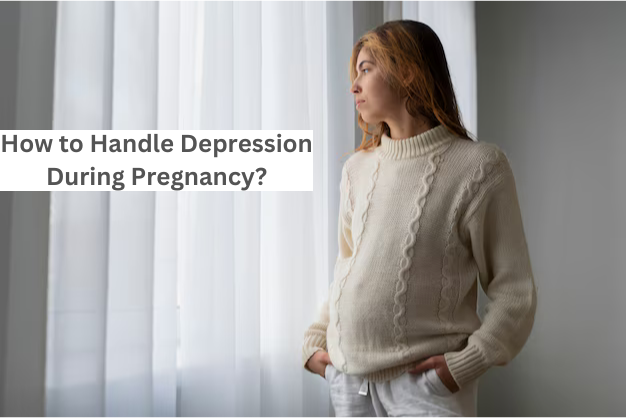How to Handle Depression During Pregnancy?
Pregnancy is a time of joy and anticipation, but it can also be a period of emotional turmoil. Hormonal fluctuations, physical discomfort, and the stress of impending motherhood can contribute to feelings of sadness, anxiety, and depression. If you're struggling with depression during pregnancy, know that you're not alone, and there are effective ways to manage these feelings.
Understanding Pregnancy-Related Depression
Pregnancy-related depression, also known as perinatal depression, can affect women at any stage of pregnancy, from conception to the postpartum period. Symptoms can vary in severity and may include:
- Persistent sadness or anxiety
- Excessive crying
- Loss of interest in activities
- Difficulty sleeping
- Changes in appetite
- Fatigue
- Feelings of worthlessness or guilt
- Difficulty concentrating
- Thoughts of harming oneself or the baby
Causes of Pregnancy Depression
Several factors can contribute to pregnancy depression, including:
Hormonal Changes: Fluctuating hormone levels during pregnancy can affect mood.
Physical Discomfort: Physical symptoms like fatigue, back pain, and morning sickness can be emotionally draining.
Stress and Anxiety: Concerns about childbirth, finances, and parenting can increase stress levels.
Lack of Social Support: A lack of support from family and friends can exacerbate feelings of isolation and loneliness.
Previous History of Depression: Women with a history of depression are more susceptible to experiencing it during pregnancy.
Coping with Pregnancy Depression
If you're experiencing symptoms of depression during pregnancy, it's important to seek help. Here are some strategies to help you cope:
1. Seek Professional Help:
Consult Your Doctor: Talk to your doctor about your symptoms. They can assess your condition and recommend appropriate treatment options.
Consider Therapy: Cognitive-behavioral therapy (CBT) can be effective in managing depression.
Medication: In some cases, medication may be prescribed to alleviate symptoms.
2. Practice Self-Care:
Prioritize Sleep: Aim for 7-8 hours of quality sleep each night.
Healthy Diet: Eat a balanced diet to fuel your body and mind.
Regular Exercise: Engage in moderate-intensity exercise, such as walking or swimming.
Relaxation Techniques: Practice relaxation techniques like yoga, meditation, or deep breathing.
3. Build a Support System:
Connect with Others: Talk to your partner, family, or friends about your feelings.
Join a Support Group: Connecting with other women who are going through similar experiences can be helpful.
4. Manage Stress:
Time Management: Break down tasks into smaller, manageable steps.
Set Realistic Expectations: Don't strive for perfection; focus on what's important.
Practice Mindfulness: Pay attention to the present moment and avoid worrying about the future.
If you're struggling with depression during pregnancy, please know that you're not alone. By seeking help and taking steps to manage your mental health, you can improve your well-being and ensure a healthier pregnancy.
Depression and Postpartum Care
Depression during pregnancy can sometimes lead to postpartum depression. Preparing for mental health care after delivery is equally important.
- Create a postpartum plan that includes emotional support, adequate rest, and professional counseling if needed.
- Join postpartum support groups to share experiences and seek guidance.
Conclusion
Pregnancy is a transformative journey that comes with its unique set of challenges. Depression during pregnancy is not a sign of weakness but a medical condition that requires attention and care. At New World Fertility Centre in Delhi, we are committed to supporting women through every step of their pregnancy journey, ensuring both their physical and mental well-being.
If you or someone you know is struggling with depression during pregnancy, do not hesitate to reach out to a healthcare provider. Remember, seeking help is the first step towards healing.
Frequently Asked Questions (FAQs)
1. What is prenatal depression?
Prenatal depression refers to depression experienced during pregnancy. It is a mood disorder caused by hormonal changes, emotional stress, or other factors and is characterized by persistent sadness, fatigue, and difficulty concentrating.
2. Is it normal to feel depressed during pregnancy?
While mood swings are common due to hormonal changes, persistent feelings of sadness or hopelessness may indicate depression. It’s important to seek help if these feelings interfere with daily life.
3. What are the symptoms of depression during pregnancy?
Common symptoms include:
- Persistent sadness or hopelessness
- Loss of interest in daily activities
- Sleep disturbances
- Appetite changes
- Fatigue
- Difficulty concentrating
- Feelings of guilt or worthlessness
4. Can depression during pregnancy affect my baby?
Yes, untreated depression can increase the risk of preterm labor, low birth weight, and developmental issues in the baby. Seeking treatment is crucial to ensuring both maternal and fetal health.
5. What causes depression during pregnancy?
Common causes include:
- Hormonal changes
- Stress or anxiety about pregnancy
- History of depression
- Lack of emotional support
- Physical discomfort during pregnancy

 Dec-03-2025
Dec-03-2025